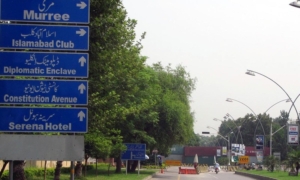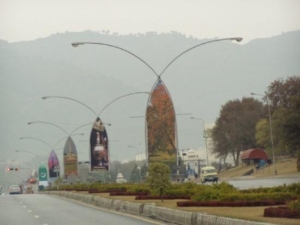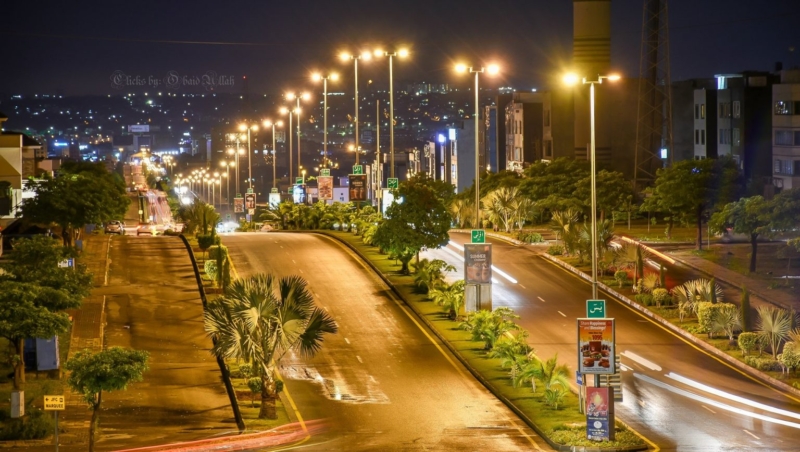Bemoaning Islamabad’s fall from grace
Not long ago, Delhi and Lahore were vulnerable to hordes of foreign invaders. The Mongol fear was overwhelming and indeed Delhi, the capital of the Caliphate for nearly eight centuries, was time and again ravaged by Central Asian fortune hunters. The builders and beneficiaries of idyllic Islamabad may have forgotten the shrill lesson of history: once the central throne was weak and maladministration at its peak, invasions and insurgencies were almost a natural consequence.
Today, sleepy Islamabad, with its clear skies and majestic hills, has turned into a classic capital under siege. It is not just under siege from Islamists; internal forces are also set to eat it up in pursuance of a suicidal streak that runs along the faultlines of Margalla-land
Today, sleepy Islamabad with its clear skies and majestic hills has turned into a classic capital under siege. It is not just under siege from the Islamists; the internal forces are also set to eat it up in pursuance of a suicidal streak that runs along the fault-lines of the Margalla-land.
After a long time away, a day in the capital was a trip into a fear-zone. Although it was admittedly for work reasons, the experience was nevertheless insightful and a little melancholic, especially when one has lived in Isloo during peaceful times. It is not pleasant to see a loveable city turn into a ghetto of barricades, echoing of trepidation; and incessantly wobble on the slippery foundations of civilian power-sharing arrangements. Since the suicide bombing at the Chief Justice’s reception last summer, the slide of the city’s law and order into chaos has been remarkably swift and unrelenting. The Lal Masjid saga, its location, proximity to the invisible force of the power market and bungled operations were clearly reflective of the seething unrest within the polity.
My parents were locked inside the house and recounted those few days with curfews, blackouts, nightly explosions and panic in the air. This had never happened before and a new history akin to the mainland was being scripted for the capital. The rest is history as they say, from the targeting of foreign missions, restaurants, hotels and not to mention the excesses against the sitting Chief Justice and later the lawyers and the media personnel.
The Serena Hotel, an architectural gem, is no longer accessible to the public
This has surely made the proverbially oxymoronic Constitution Avenue a no-go area. On the crisp Thursday morning when I arrived in the city to attend a meeting in the besieged diplomatic enclave, the multiplicity of barricades was astounding. The Serena Hotel, an architectural gem, is no longer accessible to the public; in fact, normal traffic cannot pass on the road that leads to Constitution Avenue. The diplomatic enclave, now proposed to be a gated hamlet within the capital, is also nearly impossible to enter unless you have passes, stickers on vehicles and various identifications ready for inspection.
I wonder what the inhabitants of the diplomatic enclave feel. Apparently, nervousness is rampant despite the sense of adventure that many an international staff share as a life trait. Once inside, life within the compounds replicates “home” with ex-pat clubs, festivals and international nights, or so I am told. My friend, LA, from Canada, is undaunted as she continues to attend parties and even sneak into local markets with Pakistani friends and acquaintances. Not all ex-pats are so lucky: most have sent their families back to the countries of their residence and are barred from going to local markets and restaurants. Essentially, they are limited to the securer circles of work and living.

The obvious question that evades the attention of foreign missions is how much are they, if at all, responsible for all that is happening to Pakistan, particularly Islamabad. If the NATO allies are unable to control Afghanistan despite the massive amounts spent on the war machine, then there is something wrong somewhere. And, if billions in relief, emergency and development aid have been unable to alleviate the miseries faced by Afghan people, then the aid architecture should be revisited or perhaps scrapped to avoid senseless technical assistance on sophisticated government machinery in a country where millions are maimed, hungry and shelter-less.
Islamabad is also a haven for all the planners, architects and beneficiaries of international aid industry. This is what has made Islamabad different from the rest of urban Pakistan. Men and women of all ages and ideologies are now in the service of the international development machine with well-drafted dreams hidden in thick reports, platitudes and frameworks agreed in a plethora of workshops and homes with ethnic-chic sensibilities. Even this affluent segment is scared and dejected.
Rafiq, who works as a Naib Qasid in a state agency, narrates later in the day that he has to walk extra to reach his office on Constitution Avenue. His accommodation at the other end of Islamabad is now even farther, due to the lack of walkways across the newly constructed expressways in the city. To top it all, he is scared for getting into a situation where he is blown up, as many ordinary, nameless residents of Islamabad have been. During our short interaction he remarked with some irony: “Isn’t it surprising that all the bigwigs are still there in their big cars, safe and happy. Why are we always targeted?” I had no quick and clear answer, so I deflected the conversation to other matters.

Other than the neo-Mongols with their jihad against girls’ schools, women and everything that may have to do with some form of civilisation, Islamabad has also been a victim of rapacious elites: the luxury-loving, insecure kings, the obedient knights with beautification mantras and of course the pliant contractors’ mafia. The recent spate of development at the end of the day is oddly resembles an environmental suicide bomb. Greenbelt after greenbelt has been eroded and in some cases erased; endless digging for huge motorways, a shared fetish by civvies and the khakis; and tasteless consumerism has been unleashed by an overdriven, unelected municipal executive. It is a separate matter that billions spent on the new roads and other development did not allocate much for disaster preparedness of emergency response.
As if the earthquake of 2005 was not a clear warning, the lack of equipment to fight fires at the Marriott earlier this year was. The Capital Development Authority did not have sufficient and relevant equipment to fight the fire on the Marriott’s upper floors. The entire nation, thanks to emergency-selling corporate media, saw the drama unfold; and any five-year-old could tell why the water bousers could not reach the place of fire. There were not enough emergency stairs.
Many of the new roads in Islamabad have nothing to offer to those who do not own cars
The public transport system, an institutional fiction, is striking for its non-existence. Many of the new roads have nothing to offer to those who do not own cars, manufactured by a protected cartel; and financed by a pampered banking sector sold as “economic boom” to all and sundry. Islamabad’s ethereal beauty, its only saving grace, has been badly attacked by native elites whom Churchill would have loved to see in operation. Even a bigoted, supremacist Winston Churchill could get it right sometimes. The former British Prime Minister was worried that an Independent India would be governed by gangsters, goondas and thugs someday. Opposing the zeal of Attlee in expediting the transfer of power, he is reported to have said:
“Power will go into the hands of rascals, rogues and freebooters …Not a bottle of water or a loaf of bread will escape taxation. Only the air will be free and the blood of these hungry millions will be on the head of Attlee. These are men of straw of whom no trace will be found after a few years. They will fight among themselves and India will be lost in political squabbles.”
It is hideously annoying to cite Churchill, but sometimes quotes that one hears so often come to mind, especially when they strike a raw nerve: a near admission of how out-of-place our elites are. The way Isloo-barons (and I include all those who wield and exercise power) have transferred their money into the soulless climes of Dubai says a lot about who these people are and what their real attachment to Pakistan is. As long as the fiefdom will deliver, we will get hollow patriotic speeches across Islamabad.
Chiding me for returning to Pakistan when its end is nigh, this corporate type endlessly complained about what a s**t hole Pakistan had become. Predictions of decay and disintegration flowed out as his clean, nimble fingers played with a BlackBerry
Talking to a corporate sector wallah, an [old] acquaintance, I was even more worried. After chiding me for returning to Pakistan when its end is nigh, he endlessly complained about what a s**t hole Pakistan had become. Predictions of decay and disintegration flowed out as his clean, nimble fingers played with a BlackBerry. My acquaintance also advised me to invest somewhere outside and showed his lovely Malaysian apartment in the heart of Kuala Lumpur that he had recently acquired. Islamabad, he said, had “exhausted” him, and he just “could not deal with the mess anymore.”
Whoever wanted Pakistan to be equated with Iraq and Afghanistan is doing a great job. The friends of Pakistan and their unethical think tanks and thinkers are making sure that the world is kept busy with stories of imploding Pakistan. Islamabad’s chaos serves their purpose well.
However, our onslaught on the capital is unforgivable. The mal-development, the unpreparedness for changing times and reluctance to re-orient a martial state to a more people-friendly polity cannot be condoned. This is why good old serene Islamabad is turning into the archetypal Muslim Capital.
This is not a gloomy ode to a city. Capitals do not erode that easily, at least that is what South Asian history tells us. They rise again. Like Islamabad, we also hope that “this too shall pass.”
First published in The Friday Times



